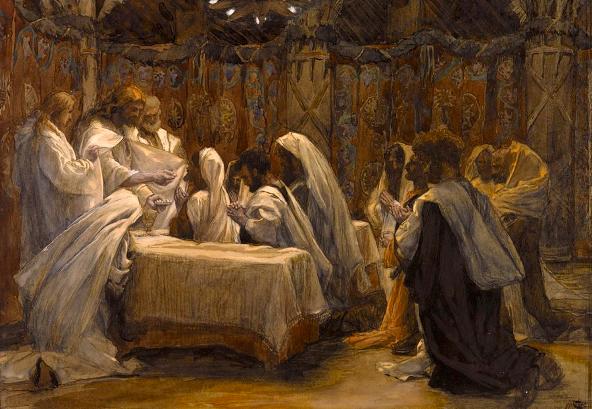DAILY MEDITATION: "It is my body. This is my blood"
Liturgical day: Body and Blood of Christ (B)
 Gospel text (Mk 14,12-16.22-26): On the first day of the Festival of Unleavened Bread, the day when the Passover Lamb was killed, the disciples asked to Jesus, "Where would you have us go to prepare the Passover meal for you?". So Jesus sent two of his disciples with these instructions, "Go into the city and there a man will come to you carrying a jar of water. Follow him to the house he enters and say to the owner, ‘The Master says: Where is the room where I may eat the Passover meal with my disciples?’ Then he will show you a large room upstairs, already arranged and furnished. There you will prepare for us". The disciples went off. When they reached the city, they found everything just as Jesus had told them; and they prepared the Passover meal.
Gospel text (Mk 14,12-16.22-26): On the first day of the Festival of Unleavened Bread, the day when the Passover Lamb was killed, the disciples asked to Jesus, "Where would you have us go to prepare the Passover meal for you?". So Jesus sent two of his disciples with these instructions, "Go into the city and there a man will come to you carrying a jar of water. Follow him to the house he enters and say to the owner, ‘The Master says: Where is the room where I may eat the Passover meal with my disciples?’ Then he will show you a large room upstairs, already arranged and furnished. There you will prepare for us". The disciples went off. When they reached the city, they found everything just as Jesus had told them; and they prepared the Passover meal.
While they were eating, Jesus took bread, blessed and broke it, and gave it to them. And he said, "Take this, it is my body". Then He took a cup and after he had given thanks, passed it to them and they all drank from it. And he said, "This is my blood, the blood of the Covenant, which is to be poured out for many. Truly, I say to you, I will not taste the fruit of the vine again until the day I drink the new wine in the kingdom of God".
After singing psalms of praise, they went out to the Hill of Olives.
"It is my body. This is my blood"
Mons. José Ángel SAIZ Meneses, Archbishop of Seville
(Sevilla, Spain)
Today we solemnly celebrate Christ's Eucharistic presence amongst us, “the gift by excellence”: "It is my body (...). This is my blood" (Mk 14,22-24). Let us get ready to stimulate our soul with the “Eucharistic wonder” (St. John Paul II).
In their Passover meal the Jewish people commemorated the history of salvation, the wonders God bestowed upon his people, especially their deliverance from slavery in Egypt. During this commemoration, each family ate the Paschal Lamb. Jesus Christ becomes the new and definite Paschal Lamb sacrificed in the Cross and eaten in the Eucharistic Bread.
The Eucharist is sacrifice: the sacrifice of Christ's immolated body and his blood shed for all of us. This was already anticipated in the Last Supper. And, throughout history, it will be renewed with each Eucharist. In the Eucharist we find our nourishment: it is the new nourishment that provides the Christian with life and strength on his way towards the Father.
The Eucharist means Christ's presence amongst us. The resurrected and glorious Christ dwells with us, in a mysterious but real way, in the Eucharist. This presence implies on our side a worship attitude and an attitude of personal communion with Him. His Eucharistic presence guarantees that He remains with us and is working on his salvation plan for us.
The Eucharist is a mystery of faith. It is the Church's centre and key of life. It is the source and the deeper roots of the Christian existence. Without the Eucharistic presence the Christian faith would be just reduced to a philosophy.
With the institution of the Eucharist Jesus gives us the commandment of love of charity. It is not either the last advice from the friend that is going far away or from the father who is getting ready for his final journey. It is the confirmation of the dynamism He provides us with. With the Baptism we start a new life that is nourished with the Eucharist. The dynamism of this life impels us to love our neighbours and it is a dynamic growth that may even induce us to sacrifice our own life: it is in this context that the world will realize we are Christians.
Christ loves us because He receives the life from the Father. We shall love by receiving the life from the Father, especially through the Eucharistic nourishment.
Source: evangeli.net

